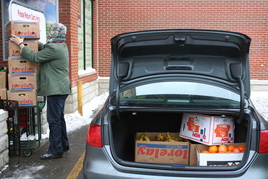How Rajesh Karmani and his company Zero Percent plan to reduce the 33 million tons of food wasted every year

Knowing there had to be a better way to connect the vast quantities of food surplus with the organizations that needed it most, Raj founded Zero Percent with that very goal in mind. Utilizing his computer science background, Raj set out to build a convenient, safe, and efficient online food donation marketplace helping restaurants move surplus food to nearby soup kitchens and shelters. “For me, Zero Percent was at the nexus of what comes natural to me, what felt right to me, and what interests me,” Raj explained.
While Raj was trying to get his company off the ground in Champaign, just a few hours away, a program was being built to help startups just like Zero Percent. Operating out of co-working center 1871 in Chicago’s Merchandise Mart, Impact Engine was created as a 16-week startup accelerator offering mentorship, support, and resources to companies addressing societal and environmental challenges. When Zero Percent was accepted into Impact Engine’s second round of startups, Raj knew the opportunity would serve as the perfect chance to help him learn about his business at a rapid pace. With the help of Impact Engine, Zero Percent is now working with over fifty nonprofits (Pacific Garden Mission, Franciscan Outreach, and Salvation Army to name a few) and is receiving regular food donations from well-known businesses and restaurants all over Chicago including Goddess and Grocer, Hannah’s Bretzel, and Dimo’s Pizza. I got a chance to sit down with Raj to hear more about Zero Percent and how he began his crusade against food waste.
 food being donated through Zero Percent
food being donated through Zero Percent I finished college in 2005, and I initially started doing some freelance consulting for companies in the UK, Pakistan, and the U.S., so that was my first jump into entrepreneurship. I got admitted into a PhD program and for a while in that academic setting I got the chance to teach and do research. I seriously considered pursuing an academic path, but I think during that time, entrepreneurship was aways in the back of my mind, but it just wasn’t getting the right outlet.
Q: Both you and Caleb Phillips (CTO of Zero Percent) have very impressive backgrounds in computer science, so you have the technology side of the company pretty well covered. What has the learning process been like when it comes to running the business side of things?
We’re certainly learning a lot as we grow. Caleb came from a non-profit background, so he brought a lot in terms of knowing about food waste, food hunger, and non-profit management. I was about to graduate and I came across this idea that combined my interests in technology, entrepreneurship, and volunteerism, but I knew I still had a lot to learn about business.
U of I has a great incubator program called EnterpriseWorks so we got space and membership there for six months. It was a way to surround myself with smart entrepreneurs in the area. As soon as that was ending and my graduation was approaching, we got the offer from Impact Engine and it could not have been a better fit considering it was based in Chicago and had a focus on social entrepreneurship. They have been great at connecting us with mentors and advisors. It’s a lot of learning every day, and there’s still plenty more to learn.
Q: When you are trying to get businesses and restaurants to use Zero Percent, how do you convince them to sign up?
Our early adopters are companies where green and sustainability is part of their culture. These are businesses that have tried sustainability projects before but it did not work for them. Then, we build upon those experiences and explain our additional benefits, like how these businesses can promote their food donations to their employees and customers. We also explain the benefits of the data they receive from Zero Percent and the chance to create operating efficiencies and reduce costs such as trash hauling.
Q: With a business like this that depends so much on logistics, what are certain metrics you guys are constantly tracking and trying to improve upon?
At the crudest level we track how many pounds of food are rescued in a day. We want to grow this from where we are now at 1,500 pounds per day to 15,000. Doing so will give us operational and business metrics that we can show to potential customers and investors and convey what we do best, which is rescue pounds at the lowest cost, in the shortest amount of time, and in the safest way possible. This is a hard problem because there are so many variables involved such as time, location, and size of delivery. The real challenge is meeting those at the supplier side and the need side.
Q: What’s the biggest challenge of expanding this to cities across the country that need it just as badly as Chicago?
The challenge would be how to efficiently reach new donors. Restaurants are busy, time constrained, and cash strapped, so it is about finding more early adopters to help us grow. We learned a lot in Champaign and Chicago, and we want to take what we’ve learned to help us scale here and grow to other communities.




 RSS Feed
RSS Feed
